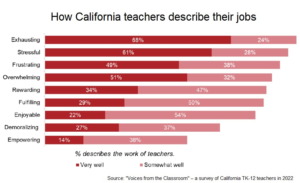Public school teachers often go above and beyond for their students.
For years, they’ve put in long hours before and after classes, providing tutoring and extra technology, and giving up their own personal time — and all of that sacrifice is considered normal.
Since the Covid-19 pandemic began, teachers have had to adapt to teaching over Zoom, then the whiplash of returning to in-person classes to serve a large number of students who fell behind.
What motivates teachers to endure it all and stay in their jobs?
“Even though it doesn’t pay very well, it’s so rewarding and that’s what kept me going,” said Amy Jennings, an 11th grade history teacher.
However, the grind is beginning to wear on many teachers.
According to a survey by the teachers union in Los Angeles, 70% of its members have thought about quitting. The union says the number of teachers who actually did leave their jobs in 2020-21 increased 38% from the previous year. Retirements rose 12%.
Financial security remains a constant concern in the profession.
The Economic Policy Institute said that teachers make 23 percent less money than comparable college graduates in 2021 — a record.
The L.A. survey of more than 13,000 educators found that almost 60 percent of teachers reported not being able to afford to live in the communities where they teach.
According to a different survey commissioned by California’s largest teachers union, Hart Research and Associates asked teachers were asked to rate whether words described their jobs. The word that the largest percentage of respondents chose to describe teaching? “Exhausting.”

Source: California Teachers Association/UCLA Center for the Transformation of Schools
“I can say it is exhausting and empowering at the same time,” said Alina Simonia, a teacher at an L.A. Unified school in Sunland-Tujunga. She has been teaching for more than 25 years.
“The exhausting part is the political arena of education that you have to fight, including standards and numbers-based performance,” Simonia said, referring to the standardized testing that teachers say crowds out time for other classroom activities.
First-year teachers must face a different set of challenges to avoid burnout.
“Taking it one step at a time when you know things are due has always helped me,” said Ramiro Esquivel, who’s in his first year in the classroom.

In a survey by the RAND Corporation, twice as many educators reported higher job-related stress than people in other professions. Nearly three-quarters of teachers surveyed reported experiencing job-related stress, compared to just 35% of working adults. Around 17% of working adults reported feeling symptoms of depression; among teachers, that figure is 28%, RAND found.
The students’ needs have usually been put first and Simonia hopes to keep it that way.
“I want to fully teach students in a manner where their needs are really met,” Simonia said.
Ramiro said that guiding the next generation is why he chose the job in the first place.
“When students get older, one day I hope that at least one student remembers me and that I made an impact on them,” Esquivel said.
This show was produced by Lupita Baltazar, Justin Borses & Sade Pullen

 Tweet this Video
Tweet this Video Share on Facebook
Share on Facebook Share via E-mail
Share via E-mail

